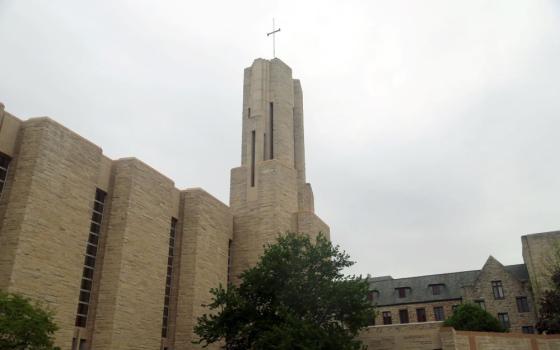
Detail of a 16th-century Portuguese painting of Pentecost by an unknown artist (Wikimedia Commons/Jose Goncalves)
The feast of Pentecost, occurring 50 days after the Resurrection, intentionally involves sight and sound to attract attention to the descent of the Holy Spirit. The bells and whistles (mighty wind and tongues of fire) send a message: Pay attention! The time has come. The gift of the Holy Spirit (God within us) is intended for the whole of humanity, not only the chosen people.
The New Testament story of the Holy Spirit, the third person of the Trinity, begins in Scripture with a revelation to Mary of Nazareth by the angel Gabriel: "The Holy Spirit will come upon you and the power of the Most High will overshadow you" (Luke 1:35).
Quiet and astonishing. A revelation to one person.
The Holy Spirit comes again after the baptism of Jesus: "Heaven was opened and the Holy Spirit descended upon him in bodily form like a dove" (Luke 3:22). From this time on, Jesus is led by the Spirit, as is noted frequently in Scripture describing his human life.
A revelation with symbolism, viewed by others.
When Jesus gave up his spirit, was raised, and ascended into heaven, he promised to send his spirit — the Holy Spirit — to his followers who were left behind. But immediately the recipients were multiplied. Everyone — all flesh — receives an invitation.
Picture this scene. The apostles; Mary, the mother of Jesus; and other disciples are gathered together in the upper room to celebrate the Jewish Feast of Weeks. They hear the sound of a "strong, driving" wind (a biblical symbol of the Holy Spirit) and tongues of fire form over each one's head. The recipients begin to speak in different languages as the Spirit enables them. They burst open the door and come out into a plaza filled with local people and visitors from all the surrounding countries.
Advertisement
Everyone hears the praise of God in his own language. Initially, the crowd thinks that these men are drunk.
Then Peter takes center stage and tells the people that his followers are not drunk: "It is only nine o'clock in the morning" (Acts 2:15). He then reveals the message of the prophet Joel:
"It will come to pass in the last days," God says, "that I will pour out a portion of my spirit upon all flesh. Your sons and your daughters shall prophesy, your young men shall see visions, and your old men shall dream dreams" [Acts 2:17].
(Notice the inclusion of women.)
Peter further explains this phenomenon, until the crowd asks: "What are we to do?" And all those with eager hearts, "about three thousand people" repent and are baptized. The first Christian community, including Jews and Gentiles, forms itself under the power of the Holy Spirit.
As we ponder this scene, it becomes clear that the desire of God "that all may be one" came about through the power of the Holy Spirit.
Let us ponder another area in which this prophecy could be and should be fulfilled: a universal Catholic Church in which all members are united, through the power of the Holy Spirit.
What would change? Everything! Women theologians would not face discrimination. Women sacristans would be valued and respected. Altar boys and girls would be carefully taught their role in the liturgy, and the clergy whom they serve would treat them with honest appreciation.
Women and men parishioners who bring their personal concerns to a pastor would be welcomed, heard, advised and thanked. Liturgists, music directors, choirs and catechetical teachers would be valued as experts in their fields, and the clergy persons, parishioners and parents whom they serve would give them gratitude and full support.
Leaders of the church would value the prophetic ideas of young people — ideas that could only come from youth. Parish councils would feel empowered and supported. Women leaders in every area of service would be welcomed.
The wisdom (the dreams) of parish elders, men and women, would be sought. People at the peripheries would be artfully drawn to the center. Arms would always reach out. Mutual love would flow. The church would become the people of God who love one another as God loves each of them.
During this Pentecostal season, let us lift up our voices and cry out, "Lord, send down your Spirit, and renew our church and our world."







